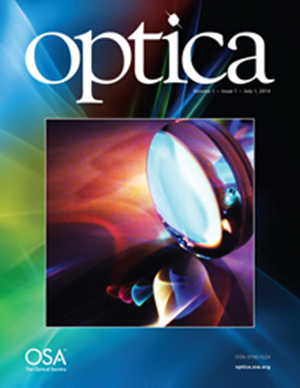Integrated chirped photonic-crystal cavities in gallium phosphide for broadband soliton generation
IF 8.5
1区 物理与天体物理
Q1 OPTICS
引用次数: 0
Abstract
Chirped mirrors have underpinned advances in ultra-fast lasers based on bulk optics but have yet to be fully exploited in integrated photonics, where they could provide a means to engineer otherwise unattainable dispersion profiles for a range of nonlinear optical applications, including soliton frequency comb generation. The vast majority of integrated resonators for frequency combs make use of microring geometries, in which only waveguide width and height are varied to engineer dispersion. Here, we present an integrated photonic-crystal Fabry–Pérot resonator made of gallium phosphide (GaP), a material exhibiting a Kerr nonlinearity 200 times larger than that of silicon nitride and a high refractive index that permits the creation of strongly chirped photonic-crystal mirrors. Leveraging the additional degrees of freedom provided by integrated chirped mirrors, we disentangle optical losses from dispersion. We obtain an overall dispersion that is more anomalous than that achievable in both silicon nitride and gallium phosphide ring resonators with the same free-spectral range (FSR), while simultaneously obtaining higher quality factors than those of GaP ring resonators. With subharmonic pulsed pumping at an average power of 23.6 mW, we are able to access stable dissipative Kerr frequency combs in a device with a FSR of 55.9 GHz. We demonstrate soliton formation with a 3-dB bandwidth of 3.0 THz, corresponding to a pulse duration of 60 fs. This approach to cavity design based on photonic-crystal reflectors offers nearly arbitrary dispersion engineering over the optical transparency window of the nonlinear material.用于产生宽带孤子的磷化镓集成啁啾光子晶体空腔
啁啾镜支撑了基于体光学的超快激光器的进步,但在集成光子学中尚未得到充分利用,而在集成光子学中,啁啾镜可以为一系列非线性光学应用(包括孤子频梳的产生)提供一种无法实现的色散工程方法。绝大多数用于频梳的集成谐振器都使用微孔几何结构,其中只有波导的宽度和高度可通过改变来设计色散。在这里,我们展示了一种由磷化镓(GaP)制成的集成光子晶体法布里-佩罗共振器,这种材料的克尔非线性比氮化硅大 200 倍,并且具有高折射率,可以制造出强啁啾光子晶体镜。利用集成啁啾镜提供的额外自由度,我们将光学损耗与色散分离开来。我们获得的总体色散比具有相同自由光谱范围(FSR)的氮化硅和磷化镓环形谐振器更反常,同时获得比磷化镓环形谐振器更高的品质因数。利用平均功率为 23.6 mW 的亚谐波脉冲泵浦,我们能够在 FSR 为 55.9 GHz 的器件中获得稳定的耗散克尔频梳。我们展示了 3.0 THz 3-dB 带宽的孤子形成,相当于 60 fs 的脉冲持续时间。这种基于光子晶体反射器的腔体设计方法可在非线性材料的光学透明窗口内提供近乎任意的色散工程。
本文章由计算机程序翻译,如有差异,请以英文原文为准。
求助全文
约1分钟内获得全文
求助全文
来源期刊

Optica
OPTICS-
CiteScore
19.70
自引率
2.90%
发文量
191
审稿时长
2 months
期刊介绍:
Optica is an open access, online-only journal published monthly by Optica Publishing Group. It is dedicated to the rapid dissemination of high-impact peer-reviewed research in the field of optics and photonics. The journal provides a forum for theoretical or experimental, fundamental or applied research to be swiftly accessed by the international community. Optica is abstracted and indexed in Chemical Abstracts Service, Current Contents/Physical, Chemical & Earth Sciences, and Science Citation Index Expanded.
 求助内容:
求助内容: 应助结果提醒方式:
应助结果提醒方式:


